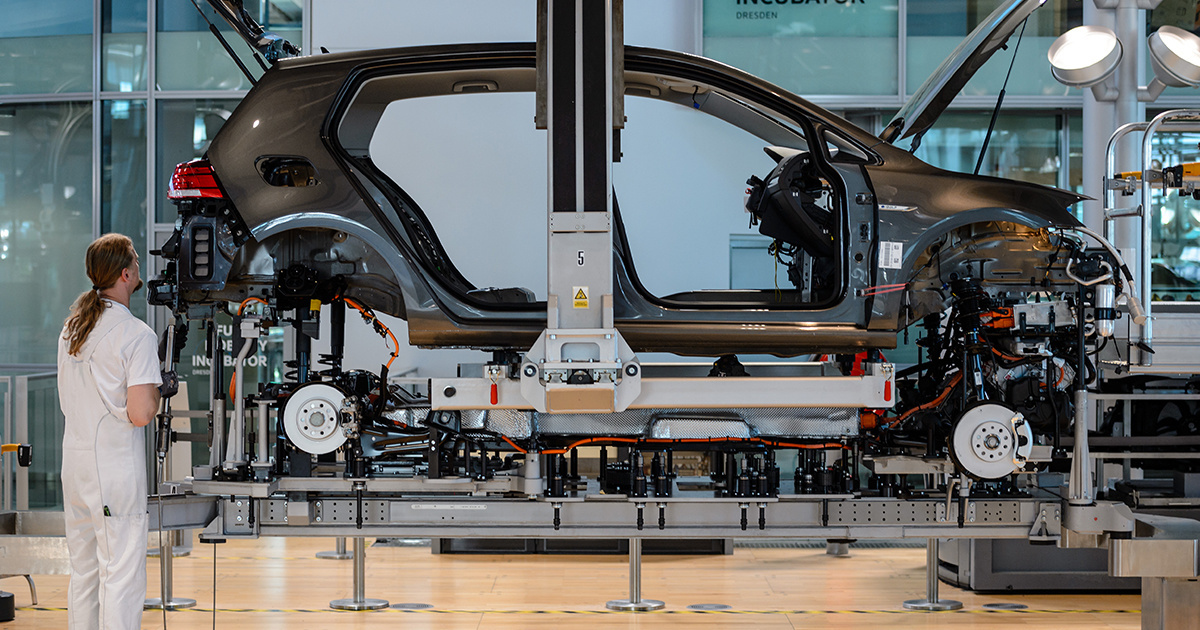
Volkswagen Ups Its EV Production, Aims to Be Carbon Neutral by 2050

A Volkswagen e-Golf electric car in production. Jens Schlueter / Getty Images
Volkswagen plans to go carbon neutral by 2050, the word’s current largest vehicle maker announced at a news conference Tuesday where CEO Herbert Diess acknowledged that the company’s cars caused one percent of global carbon dioxide emissions, The New York Times reported.
“We aim to reduce this to zero,” he said.
As part of its efforts to decarbonize, the company is supercharging its production of electric vehicles. The company will produce almost 70 new electric models by 2028, up from the 50 previously planned, bringing total projected electric vehicle production by that date up from 15 to 22 million, the car-maker announced in a press release.
#Volkswagen extends electric offensive
▪️Fully CO2-neutral balance in the fleet and in production by 2050
▪️Almost 70 new electric models by 2028
▪️The MEB lies at the heart of Volkswagen’s electric offensivehttps://t.co/t3kXMb6sY2— Volkswagen Group (@VWGroup) March 12, 2019
Volkswagen sold a record 10.8 million vehicles in 2018, but only 40,000 were electric and 60,000 were hybrids, CNN reported.
“Carmakers around the world regard the demise of the internal combustion engine as only a matter of time, and many have set ambitious targets for sales of electrics and hybrids. Yet they are starting from a very small base,” CNN’s Charles Riley wrote.
One thing carmakers are trying to do to ease the transition is to work together to research and develop electric cars. To this end, Volkswagen said it would share its Modular Electric Toolkit (MEB) with other automakers.
In addition to increasing its electric fleet, the company’s decarbonization plans also include powering factories with renewable energy, compensating for unavoidable emissions and working on reducing the emissions of the entire production cycle, from supplies to recycling.
Decarbonization is important to halt climate change. But what exactly is behind it? And what is #VW doing about it? https://t.co/nM0YaUdZZz pic.twitter.com/bQwgyT2Y83
— Volkswagen News (@volkswagen) March 12, 2019
In a company webpage on decarbonization, Volkswagen acknowledged that an electric vehicle was only as sustainable as the energy that powers it. The site pointed to the need to address factors such as the current energy intensity of cell production and the use of coal-powered energy to charge electric cars.
“The strategic goal of becoming the leading worldwide provider of e-mobility can make the focus on consistent decarbonization a strong competitive edge,” Volkswagen’s independent sustainability advisory board spokesman Georg Kell said. “In any case, it offers the best way for setting a common course for a secure and economically successful future on a planet worth living on.”
Hippie-Approved Volkswagen Electric Microbus Soon to Hit the Road https://t.co/pqDymqBViX @UKVolkswagen @SierraClub @NRDC @UCSUSA
— EcoWatch (@EcoWatch) June 21, 2017

 233k
233k  41k
41k  Subscribe
Subscribe 